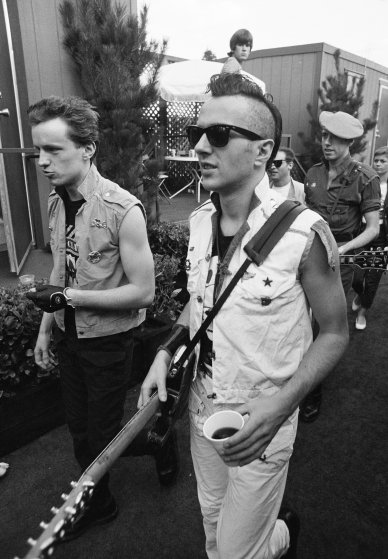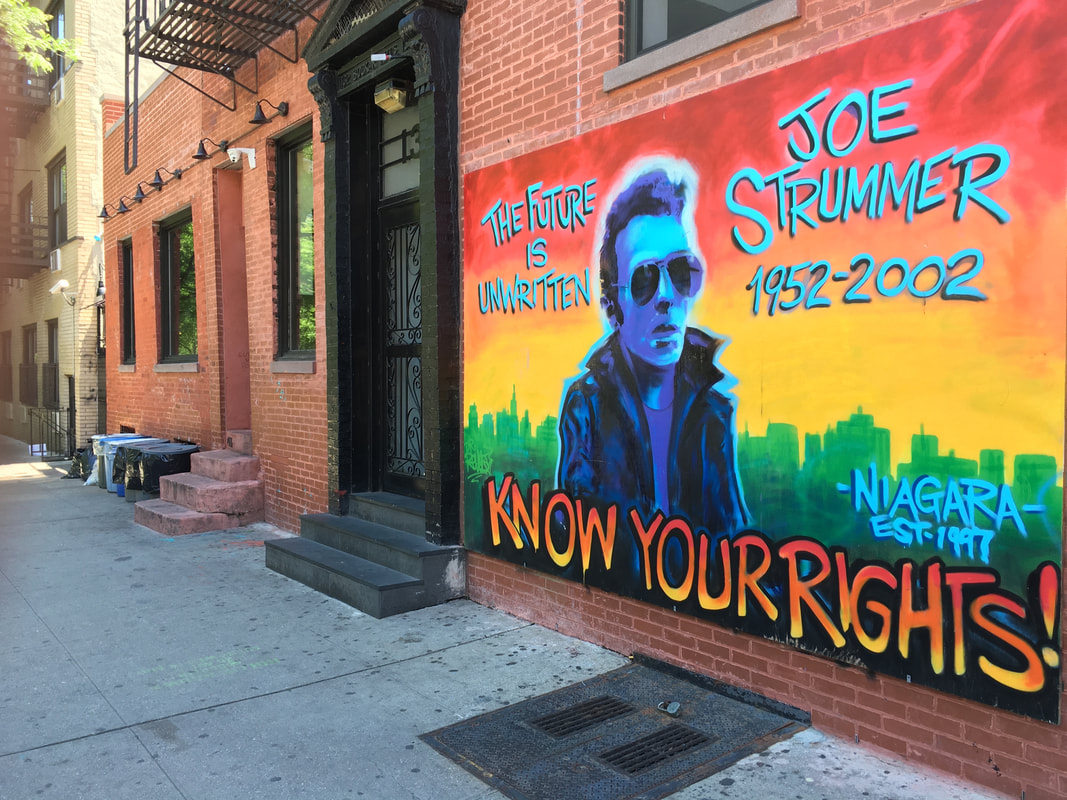|
2/22/2018 Narratives in Music: The Clashby Douglas Menagh In 1976, Joe Strummer of The Clash said to NME, “I think people ought to know that we're anti-fascist, we're anti-violence, we're anti-racist, and we're pro-creative.” The Clash, with Mick Jones on guitar, Paul Simonon on bass, and Topper Headon on drums, emerged in the late 70’s punk scene, and from the beginning, created music that questioned authority and attacked those who abused their power. Their politically charged and diverse sound protested fascist politics and far right movements by taking a stand on social and political issues. The Clash emboldened their listeners to take a stand for what’s right too, and in the process, made a difference to peoples’ lives. The first record released by The Clash was their eponymous debut in 1977. The album opens with “Janie Jones,” a song Martin Scorsese says is the greatest British rock song. “Janie Jones” features raw riffs, sweet chanting, and a groovy beat that can turn any living room into a mosh pit. On “Janie Jones,” Joe Strummer sings, “He's in love with rock'n'roll, woah/ He's in love with gettin' stoned, woah / He's in love with Janie Jones, woah/ He don't like his boring job, no, no, no.” The song empowers listeners to connect with what is important to them and not society. It also shows that all change starts from within, and if listeners want to change the world, they’ve got to start with themselves first. “I’m So Bored With The USA” is a giant middle finger to the powerful Americans abusing their authority. Joe sings, “Yankee dollar talk / To the dictators of the world/ In fact It's giving orders.” The song shows that when Americans allow themselves to be led the greedy and corrupt, they encourage similar abuses worldwide. “Police and Thieves” covers a reggae song by Junior Murvin and addresses police brutality and gun violence. The lyrics, “Police and thieves in the streets, oh yeah/ Scaring the nation with their guns and ammunition,” equate police with the “thieves” by making them interchangeable. This cover came out 40 years ago, and police brutality and gun violence are more pervasive in society than before. Both the cover and original by Junior Murvin show listeners that they need to care about this issue, take a stand on it, and make others do so as well. Though The Clash sounded progressively less and less like a punk band as they evolved, their attitude was always punk and it shows on London Calling. London Calling marries elements of punk, reggae, and ska to create a rebellious record that distorts genres with a political message. In the song “London Calling,” Joe Strummer sings, “Phony Beatlemania has bitten the dust,” and it’s a “nuclear era but I have no fear.” If nothing else, The Clash were a serious band, and they were sincere in using their music to make listeners become more aware of their surroundings. “Lost in the Supermarket,” sung by Mick Jones, is a hilarious tune that pokes fun at the popularity of disco by sounding super poppy. Jones captures the monotony and personality-destroying motions of consumerism. Jones sing, “I’m all lost in the supermarket/ I can no longer shop happily/ I came in here for the special offer/ A guaranteed personality.” “Guns of Brixton” by Paul Simonon shows the abuse of power by authority in a way that is both meaningful, powerful, and damn catchy. Simonon sings, “You can crush us/ You can bruise us/ Yes, even shoot us/ But oh-the guns of Brixton.” It is also an example of another song that shows the pervasiveness of gun violence in our culture. Much has already been said and written of how the anti-war message of The Clash was especially pertinent during the Bush administration and the Iraq War. The album Sandinista! references the democratic and socialist group of people in Nicaragua who took back control of their government. It is a long and strange album with psychedelic sounds and audio recordings mixed to create sound on this record that crosses mediums. “The Call Up” is a pledge to not be part of a system that destroys lives, and ends with a recording of people chanting “I love the Marine Corp.” Combat Rock, the last Clash album featuring Strummer, Jones, Simonon, and Headon, brings militarism to the forefront. Though the album includes more poppy songs like “Rock the Casbah” and “Should I Stay or Should I Go,” it also features “Straight to Hell,” a sublime tune about The Vietnam War. In terms of songwriting, the lyrics are absurd, playful, and deeply moving. Strummer sings, “Clear as winter ice/ This is your paradise… Can you really cough it up loud and strong?/ The immigrants, they wanna sing all night long... There ain’t no asylum here/ King Soloman he never lived around here.” The fragility and preciousness of life comes through from deeply affecting guitar loops, soulful singing from Joe Strummer, and a beat that is catchy and hypnotizing. On record, The Clash drew upon a wide range of influences from different musical backgrounds. When it came to performances, The Clash tours also featured artists from across the musical spectrum. Bo Diddley and Lee “Scratch” Perry were openers. When Grandmaster Flash opened to them, a performance which fans misunderstood and booed, Joe Strummer confronted the crowd. Joe Strummer saw The Clash as being on a journey with fans, not superior to them, but he also saw that hip-hop and punk had more in common than his audience realized. Challenging them to change their minds and fix their hearts was the punk thing to do. The Clash used their art to showcase wide range of diverse talent, and in doing that show an eclectic artistic community is the most powerful defense against authority. Political art and music alone doesn’t have the power to stop those from abusing power, but it can make a difference to people. Joe Strummer said, “people can change anything they want to; and that means everything.” Joe died in 2002, and yet even now his music is still touching people and encouraging artists, activists, punks, and rebels to take a stand for their beliefs. In New York City, outside of a bar called Niagara, there is a mural of Joe Strummer wearing sunglasses and a leather jacket. It says, “The Future is Unwritten,” and underneath that, “Know Your Rights.” Expression and art still has the power to make a difference to people, and Joe Strummer’s music is there so you will never forget that you have rights. After listening to The Clash, it’s harder to take life for granted, and harder still to stay silent and do nothing. Audiences find new courage to confront authority because Joe, Mick, Paul, and Topper made us care more than we already did.
Comments are closed.
|
AuthorOur fabulous blog team Archives
June 2024
CategoriesAll 12 Songs Art Art And Athletes Book Review Chorus Blog Date This Book Game Of Narratives Guest Blog Letter From The Editor Lifehacks Movies Of 2019 Music Pup Sounds Smackdown Strive For 55 Summer Playlists |





 RSS Feed
RSS Feed